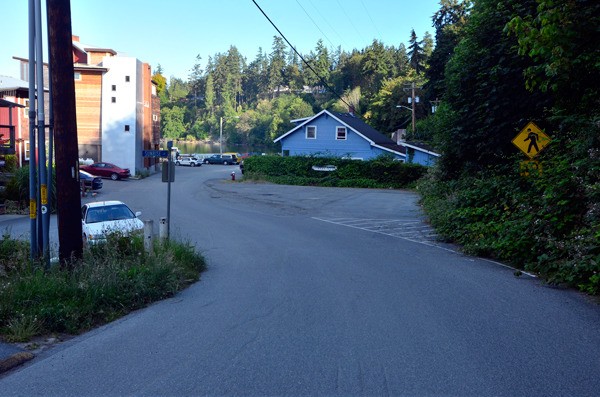In their ongoing effort to expand the marina in Langley, Port of South Whidbey commissioners took another small step toward realizing that vision recently when they agreed to consider spending $170,000 on a small parking lot on Wharf Street.
At its regular meeting this month, the board voted unanimously after an executive session to approve a purchase and sales agreement with Wharf Street Holding Company, LLC. The deal is not yet finalized and is contingent on the results of additional investigation, but both parties hope to close by Aug. 15.
The tiny triangular property is located at the bottom of the hill directly across from the Boatyard Inn. It’s paved and currently used for parking.
Commissioner Ed Halloran, who is also president of the board, said in an interview this week that parking is a continual headache for the land-cramped area of the marina, and will become even more troublesome with future phases of expansion. When the chance came up to address at least part of the problem, it was simply just too good to pass up, he said.
 “It’s an opportunity we felt like we couldn’t do without,” Halloran said.
“It’s an opportunity we felt like we couldn’t do without,” Halloran said.
It’s unclear, however, just how much of a deal the property really is. The agreed-upon purchase price of $170,000 is more than three times the Island County Assessor’s Office’s assessed 2015 value of $51,000. While it’s not uncommon for market value to differ some from an actual sale price, the
difference was enough that port officials insisted on a property valuation, said Angi Mozer, the district’s executive director.
Different from an appraisal, which is typically conducted by a real estate agent, a valuation is done by a certified valuer. Thorough and detailed, it examines all the particular’s of a property and issues.
Mozer said the result should give the port a good idea of the real value. If commissioners aren’t satisfied with the result, the contract allows the district to walk away with nothing lost but $1,000 in earnest money, she said.
According to available property records, the lot’s value has fluctuated from a low of $37,000 in 2002 to a high of $64,166 in 2014. Its purchase history is more varied. The Boatyard Inn bought it for about $39,000 in 1999, while Wharf Street Holding Company, LLC, the managing member of which is Brian Stowell, paid $318,000 in 2006.
Mozer said she was the primary negotiator for the port and was aware of the property’s varied value/sales history. The agreed-upon purchase price was the result of much dickering, she said.
“We basically came to a middle ground with the stipulation that we’d definitely be getting a valuation,” Mozer said.
Island County Assessor Mary Engle said sale prices and true market value — the number the department shoots for — is always a bit different. A big factor is that county assessments are always one year behind, which can be an eternity in certain market conditions. For example, the market is heating up and real estate prices are beginning to climb, so it’s no surprise that there’s a bigger difference than normal, she said.
“It’s a seller’s market right now and people are paying way more than market value,” she said.
Another challenge in assessing undeveloped commercial property, especially those on or near the shoreline, is that they don’t change hands often. The county uses that sales history as a tool to assign value, so when there’s a lack of data it makes it tough to come up with a solid number. In this case, Engle said the property’s value has stayed consistent largely for that exact reason. She added that although the same property sold for $318,000 years ago, a single sale isn’t enough to influence an entire market as value changes affect all such properties.
Despite the circumstances, Engle said she’s standing by the department’s assessment.
“We have no reason to change it,” she said.
The state Department of Revenue recently ranked the office’s market value assessment accuracy at 96.2 percent.
Harold Hertlein, the department’s commercial appraiser, also noted that the official property identification number on the port’s purchase agreement is for a lot that doesn’t comprise the whole paved triangle. It’s about .078 acres and part is overlapped by another lot with a permanent easement owned by the Boatyard Inn.
Hertlein estimated that only about six parking spaces could be used for the property. That’s about half what port officials had been hoping for.
When asked about the difference, Halloran said a dozen spaces would be better, but less isn’t the end of the world. Parking is an issue and will continue to be so, and even six spaces will make a dent. Also, even if parking wasn’t in the cards that space may prove useful for other unseen needs for the greater and long-range expansion project, he said.
“We bought it as a placeholder in the grand scheme,” he said.
Halloran added that he was more concerned about the property’s past within a marine area. Work on the last phase of the expansion yielded a dirty surprise for the port when soil was found to be contaminated with diesel. Concerned the district may be buying more trouble, the board agreed that an environmental assessment would also be a prudent step before signing a check.
“That was mandated by all three of us after we talked around it,” he said.
Mozer estimated the price tag of both the valuation and environmental assessment at not more than $4,000. The hope is to complete both before Aug. 15 so the board can make a final decision.


